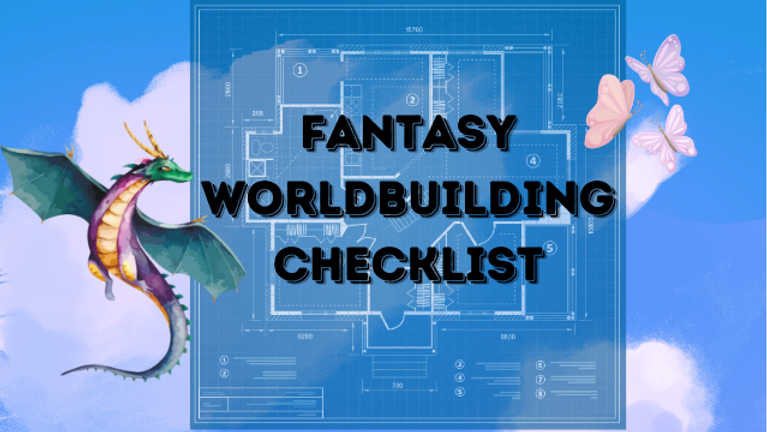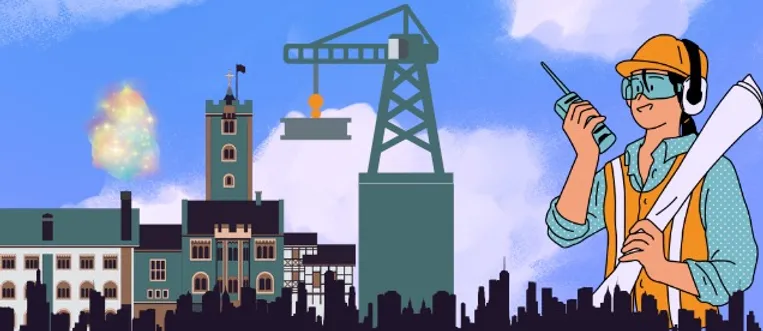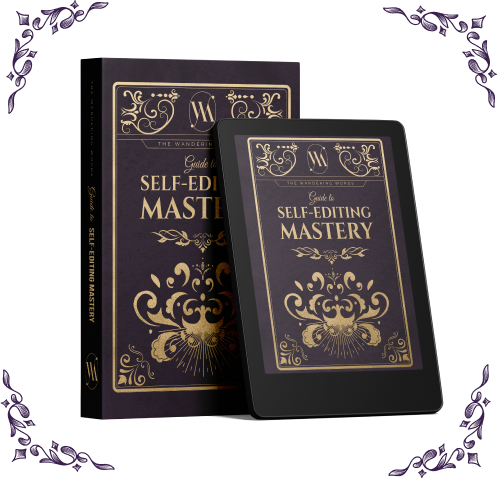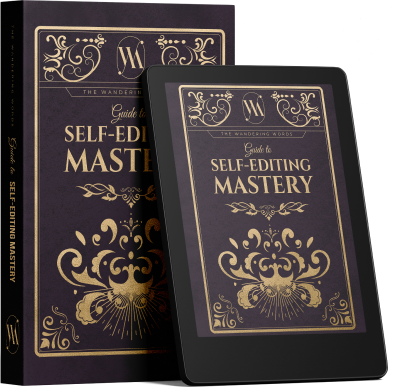
Fantasy Worldbuilding Checklist
Aug 01, 2024 • 11 minutes • by Allison Rose
Want to create an immersive fantasy world for your readers? Not sure where to start or what to cover when it comes to worldbuilding? Feel like you’ve got most of worldbuilding covered, but wondering what you can do to make your world a complete, immersive experience for your readers?
Fear not! This Worldbuilding Checklist for fantasy world creators covers fundamental aspects of worldbuilding that will make your fantasy story come alive. (Sci-fi world creators may also find it helpful.)
It’s advantageous to start considering these before beginning, but they can always be reconsidered and expanded upon as you write. And having such a list to refer back to as you write can save a lot of time and effort.
The aspects of this checklist don’t have to be considered in order, but this list is organized in a top-down manner from the big-picture aspects of the world to the more detailed. Some of these will tie into each other, so moving on to another in the case of a mental block may help. Feel free to add as you go along and make this list your own.
This checklist was created with high fantasy in mind but can still be used for low fantasy. When creating more of a low fantasy world within our own, some of these worldbuilding aspects might not apply, but others will help to infuse fantasy into the reality of the human world.

Elements to Consider When Worldbuilding
Environment (basics of the fantasy world):
- Type of environment—land, sea, desert, mountain, jungle, forest, etc. This is also where weather comes into play. Are there areas that have different weather conditions from others? If so, how might this affect the story? At this early stage of worldbuilding, it may be helpful to create a map and do research on aspects of terrain; even though this is a fantasy world, the physical aspects should make sense—or have some sort of magical reason why they don’t. Especially important to consider is the availability of water, as it is likely your life forms will need it to survive.
- Seasons—are there seasons (like a winter, spring, summer, and fall like our world)? Or are their seasons something else? What weather is involved in each? Is there magic/technology involved at all?
- Light and darkness—do their days work like ours—awake in the daylight and sleeping in the dark? Or can they see in the dark? Do the sun and moon work like ours?
- Kingdoms/territories—sketching out a map will also help with this element of worldbuilding (plus, if you get it professionally drawn up later on, fantasy readers will love it!). How did the life forms in your fantasy world divide up the terrain? We’ll get more into governance and how these life forms live soon, but for now, consider how many territories make up your fantasy world, what their names might be, and how they might relate to each other.
- Time—how do they tell time, both on a daily basis and through larger measurements such as years/eons/birth celebrations, etc.?
- Magic/technology systems—in my opinion, the coolest part of fantasy (and sci-fi). What sort of magic/odd technology exists, and how does it affect the world and the interactions of the life forms?
- Portals—if you have a portal between worlds, or our world and a fantasy world, how does it work?
The Characters and Creatures:
- Higher life forms (may or may not be humans)—list your higher species and characters. Describe their physique, taking into account the terrain they each live in. Listing specific character details such as hair and eye color here can be a major time saver when writing as well. Coming back to this part and listing things such as jobs, possessions, clothes, relationships to others, etc., might also be beneficial.
- Lower life forms (creatures)—who else inhabits this world? Are they wild creatures/animals, or pets? Where do they live? What is the relationship between these creatures and the higher life forms?
Small-Picture World Aspects:
- Homes/dwellings—where do the higher life forms shelter? Do they build, or how do they acquire it? Keep in mind the environment and tools available.
- Weapons/tools—based on what is available to them, what kind of weapons or tools would they use and under what circumstances?
- Food—what do they eat? How does it affect them? What is their attitude toward health? Are there comfort foods versus normal foods? Does available food vary by region?
- Travel—how do they get around? Is there any magic/technology involved? Time is a big consideration here.
- Possessions—do they place value on things, like jewels? Do they exchange possessions in any way?
- Currency—how do they acquire things they need? What is it, and what value does it have?
- Clothing—consider the environment and what materials are available/important to the higher life forms. Footwear and hairstyles will also be influenced by the environment, as well as possibly what territory or kingdom these life forms live in.
- Illness/medicine—how do they heal the sick/injured? What sorts of illnesses/injuries do they even have? What is their general attitude toward health and healing?
- The bathroom question—an unpleasant topic, but a necessary one. You don’t have to go too far into detail if you don’t want to, but if it seems unlikely that your world would have toilets, where do they go? A hole in the ground? Do they have a body that eliminates waste in a different fashion?
Big-Picture Social Aspects (how characters interact with the world and each other):
- Events that formed society—are there any huge events that happened to make society the way it is? War? A huge tragedy? This can be a great way to bring tension and intrigue to the story.
- Race—how does race factor into society? How do different races interact with each other?
- Social classes—describe social classes. How does movement happen, if it’s even possible? Does race factor into this? How do different social classes perceive each other?
- Government and laws/rules that keep order—what every functioning society needs. Consider which higher life forms are part of the government of each territory, and if there is also a supreme government that lords over the whole fantasy world. What laws/rules do these governments enforce? Consider the terrain and how it might affect the government and how these life forms live here. What do they value, and how might they get into trouble? What do they think of the laws/rules? What do they think of who holds the power?
- Punishment—what happens to wrongdoers? Define what they can do wrong.
- War and peace—what would spark a war? Is there conflict to the point of war, or is there relative peace? Peace agreements?
- Jobs—what kind of jobs are needed to make society work? Manual labor? Magic? Technology? Are the arts and creativity a thing?
- Schooling—every society needs a way to teach young ones how to live/pass on knowledge. Also, are books a thing? How do they record knowledge?
- Communication—how do they communicate over long distances and with each other in passing?
- Pastimes—how do they spend free time? Sports? Games? Crafts? What sort of emphasis is put on work/free time?
- Holidays/festivals/ceremonies—what do they celebrate? A new year/season? The anniversary of a special event? Birthdays?
- Music—is song or music a thing? Instruments? When and where is music used (for magic, celebration, etc.), and is dancing incorporated? Is it appropriate to sing along?
Small-Picture Social Aspects:
- Relationships—family and romantic. What does the typical family unit look like, and how do family members relate to one another? What are the physical societal norms for romance (kissing, hand holding, etc.)? And what are the relationships like (partnership/marriage)? Do race or social class come into play here?
- Standards of beauty and physical attributes—as these are fantasy life forms, what do they consider beautiful and desirable in another? This may be the same or different from our society.
- Gender—consider identity and pronouns here, as well as relationships and how society as a whole views gender. Are certain identities/behaviors frowned upon by the governing body or against societal norms? Does one gender have more power than another, or is this a society of equals?
- Age—are old or young people revered? Scorned? How long do they live? Any rites of passage/trials as they come of age? At what age do they become an adult?
- Names—careful not to get too unfamiliar. It may throw the reader off if they are unpronounceable, contain a lot of accent marks, or are so similar to one another that they are confusing. If inspired by a certain culture, make sure they are true to that culture’s spellings. A phonetic glossary might be helpful to the reader here.
- Greetings—you can use the standard “hello,” but this is somewhere you can be creative! And how do greetings differ based on social class (bowing as a sign of respect, etc.)? Or are there formal and informal greetings? In what situations should these greetings occur?
- Language/sayings—it makes a lot of sense for them to speak something common like our English so as not to confuse the reader entirely, but do they have any unique sayings? Keep in mind society as well as the world as a whole and what they value and deal with on a daily basis, as well as societal customs. Be careful here not to use exclamations like “What the hell?” if your world doesn’t have a version of “hell” in it, as the expression wouldn’t have formed naturally. Of course, if your book is set in a version of the human world, that is totally acceptable.
- Humor—what sort of things do they find funny? What sort of language do they use? Is laughing appropriate? Swearing?
- Swear words—this is also a place to be creative. They can be as clean or dirty as you want them to be.
Beliefs (aspects of psychology and unique behavior):
- Something to believe in (religion)—I say “something to believe in” because this is fantasy. Religion is a very human term, from my perspective, and you shouldn’t feel constricted when building this part of your world. Your beings can revere the natural world, a higher being, etc. How does what/who they believe in as a higher power affect their daily lives? Are there rituals, celebrations, or practices (verbal or physical) that are observed either on a daily, seasonal, or yearly basis? Do beliefs differ per region or social class?
- Death—what rituals are involved? And what do they believe happens to their souls and bodies after they die? Does this differ per region or social class?
- Birth—how are children made? And what are the customs surrounding birth? What is the fertility rate? Does gender come into play here at all?
- Other worlds—do they believe they are the only world, or do they know/believe others are out there?
- Story—I believe stories in some form should be important in any society. So how is story used? To warn of danger? To control how others think? To impart knowledge? Are they written in books, scrolls, strips of bark? Through magic/technology? Are certain stories passed down through generations?
- Psychology—what is their attitude toward mental health and well-being? Is crying considered weak, or strong? By some or by many? Are there those who study how the mind works? Is it related to magic or social class in any way? What is their definition of happiness?
- Life goals/motivations/drive/definition of success—what is a common life goal for these beings? What do they want to achieve? Mastery of magic? Money? Social status? Legacy? Does this differ among the classes? Schooling should reflect this as well.
Daily Life:
Now that many of the aspects of your society and physical world have been fleshed out, think of the daily lives of your different characters and how aspects of the world will affect them. If you’ve already started writing, a period of reevaluation could be beneficial in order to create a more immersive world and realistic characters.
- What would your characters experience daily?
- What little things do they do because of their world?
- Above all, what joy does their world bring them, and what sources of conflict? How can they overcome these?
It’s these little details of worldbuilding that will amaze readers and contribute to the overall picture of your fantasy (or sci-fi) world. It may seem like a lot, but considering and listing these worldbuilding aspects out will help immensely before and as you write.
Now go do your magic. You got this, world creator!






